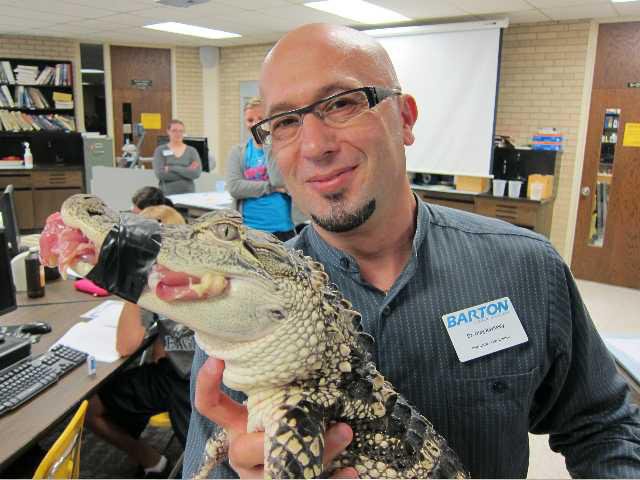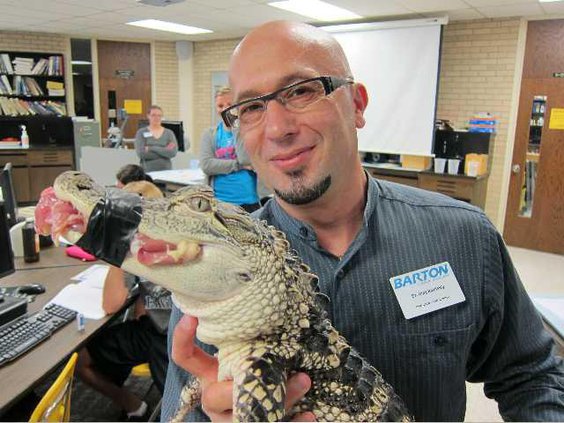Alligators are back at the Great Bend-Brit Spaugh Zoo, starting with one that spent the last three years in Dr. Oleg Ravitskjy’s life science classroom at Barton Community College.
Zoo Director Scott Gregory and staff picked up “Ally,” an American alligator believed to be 4 or 5 years old, Tuesday. Ravitskiy, a doctor of veterinary medicine, said the animal was donated to BCC almost three years ago by someone who tried to keep her as a pet, but was unable to properly care for her after about a year. He said she was simply growing too fast for the college to continue to provide her with an adequately sized shelter.
“She has almost tripled her size since last spring, and we had already built her a new cage last semester, and she just continued to grow rapidly,” Ravitskjy said. “I looked into buying a new cage for her and it was $8,000, which we just cannot afford, so I reached out to the Great Bend zoo. She is a wild animal and this is just going to be better for everyone.”
Gregory said the zoo was glad to take Ally, and up to the task.
“It’s always a pleasure to work with Barton and we were happy to be able to help out,” he said. “One of the biggest questions people always ask when they come to the zoo is ‘Where are the alligators?’ and now we have one that the public can come and enjoy and the students from Barton can also continue to see her.”
The zoo hasn’t had alligators since four adults were euthanized early in 2010, shortly after Gregory arrived and took over the director’s duties. The Sedgwick County Zoo assisted with diagnosing and euthanizing those alligators, which were reportedly beyond saving. The two larger ones were suffering from severe gout, and the smaller ones had deteriorated pancreases.
Gregory said he’s comfortable with bringing alligators back to the zoo. He’s working on getting a male to share to exhibit space with Ally.
“I lived in Florida for quite a while and that’s alligator country,” he said. “I’ve definitely had a lot of experience with alligators, and I think she’ll be a good fit for our zoo, and I’m personally excited to have her because alligators are one of my favorite animals.”
The zoo already has an enclosure ready that is perfectly suited for the new arrival, he said. The area recently occupied by Phoenix, a 12-year-old panther on loan from Texas, has a small pond and that’s where the alligator will stay in warm weather. In colder weather it will be kept indoors at the zoo. Meanwhile, the zoo is renewing its contract to care for Phoenix for another year, and will move the panther into the former jaguar exhibit.
The previous alligators wintered in storage somewhere at the Great Bend Municipal Airport grounds, but the zoo’s enclosures will be warmer, Gregory said.
“We wouldn’t have brought her in if we didn’t have the room and facilities for her,” he said. “Once she outgrows this enclosure we will be able to relocate her to one of our ponds.”
Alligators can live to be around 50 years old in captivity. When the zoo’s alligators grow larger, the staff may try to breed them, Gregory said, adding he’d like to have some alligator eggs to exhibit. But any babies would probably go to another zoo, since two is probably the most the Great Bend zoo should have.
Alligator moves from BCC to Great Bend Zoo





